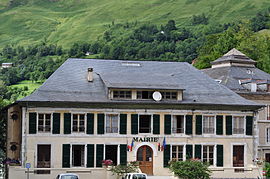Eaux-Bonnes
Eaux-Bonnes | |
|---|---|
 Town Hall | |
show Location of Eaux-Bonnes | |
 Eaux-Bonnes | |
| Coordinates: 42°58′26″N 0°23′27″W / 42.9739°N 0.3908°WCoordinates: 42°58′26″N 0°23′27″W / 42.9739°N 0.3908°W | |
| Country | France |
| Region | Nouvelle-Aquitaine |
| Department | Pyrénées-Atlantiques |
| Arrondissement | Oloron-Sainte-Marie |
| Canton | Oloron-Sainte-Marie-2 |
| Intercommunality | |
| Government | |
| • Mayor (2020-2026) | Jean-Luc Braud |
| Area 1 | 38.52 km2 (14.87 sq mi) |
| Population (Jan. 2018)[1] | 194 |
| • Density | 5.0/km2 (13/sq mi) |
| Demonym(s) | Eaux-Bonnais, Eaux-Bonnaises |
| Time zone | UTC+01:00 (CET) |
| • Summer (DST) | UTC+02:00 (CEST) |
| INSEE/Postal code | 64204 /64440 |
| Elevation | 520–2,619 m (1,706–8,593 ft) (avg. 750 m or 2,460 ft) |
| 1 French Land Register data, which excludes lakes, ponds, glaciers > 1 km2 (0.386 sq mi or 247 acres) and river estuaries. | |
show This article may be expanded with text translated from the corresponding article in French. (December 2008) Click [show] for important translation instructions. |
Eaux-Bonnes (French: [o bɔn], "good waters"; Occitan: Aigas Bonas) is a commune in the Pyrénées-Atlantiques department in south-western France.
Description[]
Eaux-Bonnes is close to the small town of Laruns. It is situated at a height of 2,460 feet (750 m) at the entrance of a fine gorge, overlooking the confluence of two rivers. The village's waters were first documented in the middle of the 14th century. The Eaux-Chaudes spa is 5 miles (8.0 km) south-west of Eaux-Bonnes, and there is fine mountain scenery in the neighbourhood of both places, the Pic de Ger near Eaux-Bonnes.[2]
The climate which characterizes the town is of "mountain climate", according to the typology of climates of France which then has eight major types of climates in metropolitan France.[3]
Gourette is a winter sports resort located in the commune on the high mountain pass Col d'Aubisque.
History[]


The historian Auguste Lorieux (1796–1842) died in Eaux-Bonnes.
Nearby to the north-west is the impressive villa Cockade, the construction of which is detailed in Dornford Yates's novel The House That Berry Built.
Population[]
|
| ||||||||||||||||||||||||||||||||||||||||||||||||||||||||||||||||||||||||||||||||||||||||||||||||||||||||||||||||||||||||||||||||||||||||||||||||
| Source: EHESS (1793-1999)[4] and INSEE[5][6] | |||||||||||||||||||||||||||||||||||||||||||||||||||||||||||||||||||||||||||||||||||||||||||||||||||||||||||||||||||||||||||||||||||||||||||||||||
See also[]
- Aas, a village in Eaux-Bonnes.
- Ossau Valley
- Communes of the Pyrénées-Atlantiques department
References[]
- ^ "Populations légales 2018". INSEE. 28 December 2020.
- ^ One or more of the preceding sentences incorporates text from a publication now in the public domain: Chisholm, Hugh, ed. (1911). "Eaux-Bonnes". Encyclopædia Britannica. 8 (11th ed.). Cambridge University Press. pp. 839–840.
- ^ Joly, Daniel; Brossard, Thierry; Cardot, Hervé; Cavailhes, Jean; Hilal, Mohamed; Wavresky, Pierre (18 June 2010). "Les types de climats en France, une construction spatiale". Cybergeo : European Journal of Geography. doi:10.4000/cybergeo.23155.
- ^ Des villages de Cassini aux communes d'aujourd'hui: Commune data sheet Eaux-Bonnes, EHESS. (in French)
- ^ Population en historique depuis 1968, INSEE
- ^ Populations légales 2018
| Wikimedia Commons has media related to Eaux-Bonnes. |
- Communes of Pyrénées-Atlantiques
- Spa towns in France
- Pyrénées-Atlantiques geography stubs


